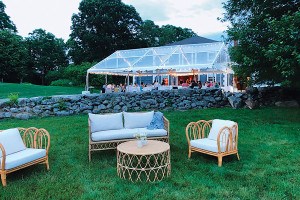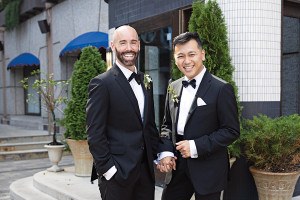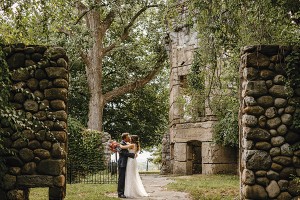Daniel Faucher Talks Custom Wedding Gowns

Custom couture designer Daniel Faucher lifts the train of one of his bridal creations. / Photo provided
You can’t say “custom wedding gown” in Boston without following it with the name Daniel Faucher Couture. With about 100 gowns made a year—a quarter of which are bridal—this gown guru made his first wedding dress when he was 13 and has been designing under his own label since 1985.
Although custom wedding gowns are often thought of as an extravagance for the elite bride who can pay a pretty penny, Faucher says that’s not always the case. The sky’s the limit on budget, but his bridal creations start at a reasonable $2,800. Also, custom often doesn’t require the eight-month lead time that most bridal shops require for ordering gowns—Faucher only needs three.
Here’s more advice from Faucher on whether a custom gown is for you:
Custom dresses have a je ne sais quoi, except actually we know exactly what it is: fit.
Truth: Unless Vera Wang designed your gown for you, no alterations will make it fit perfectly. Custom designers are starting with your measurements. “The fit is unparalleled, and the comfort in wearing something that hits at all the right points is hard to express,” Faucher says. “You also have the opportunity to choose or incorporate all the elements that you’re drawn to in this quest.”
Don’t be a Pinterest-aholic.
Open laptop. Look at the number of sites available for inspiration. Close laptop. Cry. “Brides today have such access to inspiration that I feel some are overwhelmed completely quite quickly,” Faucher explains. “This isn’t the place you want to be when deciding on one of, if not the most expensive piece of clothing that you’re ever going to purchase. Not to mention being photographed from every angle in over a thousand photographs.”
Talk, talk, talk.
Faucher treats the initial consultation as an interview for you both, during which you see how well you get along and how comfortable you are with the process. “There’s a trust factor,” he explains. “You’re entrusting I can see your vision and will be able to fulfill that promise.” After the sketching process, you’ll need to start expressing your imagination. Open your mind and your mouth, letting the designer know what you’re thinking about design, fabric, etc. “It’s definitely an ongoing process, but we try to impress upon every client that their wishes are directing our actions,” he says.
A dream is a wish your heart makes, but reality is reality.
Faucher calls the dress a “one shot deal” and tries to capture all of a bride’s wishes in the experience. But reason does come into play. “I’m a technician by trade,” Faucher says. “I’m always going to be led by the reality that a real woman is wearing this, not a dress form. It has to look great for the duration of the event. When sketching, I am tempered by the realities of the situation.” So don’t be upset if lace can’t go where you want or a certain fabric won’t drape the way you want. Fabrics and certain figure contours are temperamental.
This is a process. Roll with it.
Yes, walking into a store is easier, but a custom wedding gown is worth the wait. There’s the initial consultation—discussion, sketching out “thumbnails”, sample dress try-ons—and a second meeting—design portfolio presentation, fabric and detail samples, measurements. Before the first fitting, the pattern is made and a muslin or “toile” version of the gown is cut and sewn. “This gives you a clear outline of the silhouette and how the design actually works for your body,” Faucher explains. “All fittings and alterations occur during this phase, and the majority of decisions still pending are worked out. We also make all the final decisions regarding fabric, detail, ornamentation, underpinnings, etc.” There are normally two gown fittings and a final fitting. The process has many steps, and Faucher loves that. “As the ‘wow, this is exciting’ moments keep coming, you’re seeing more and more of your gown, your vision coming to life.”
Bring photos, visions, an open mind, and even your mother.
“I love to ask the mothers about their weddings. It’s lovely to give them a chance to reminisce,” Faucher says. “I often remind daughters, as they complain about their mother’s ‘over-invested’ interest in their wedding day, that the last time they walked down the aisle, they were the one in the big white dress. It’s a rite of passage. They want to pass that precious moment along, making sure their daughter has the same warm glowing memory.”
Getting married? Start and end your wedding planning journey with Boston Weddings' guide to the best wedding vendors in the city.


